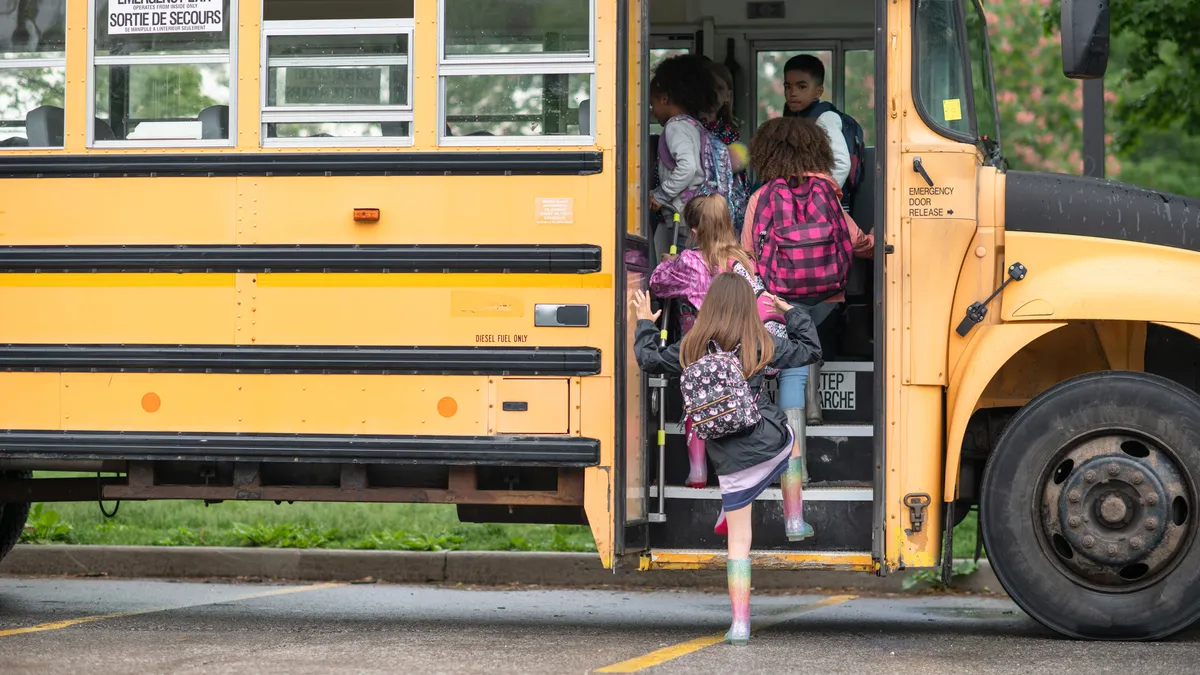As the Federal Communications Commission prepares to vote on expanding the E-rate program to include Wi-Fi hotspots, a lawsuit pending in the 5th U.S. Circuit Court of Appeals could stymie moves to modernize the program.
The lawsuit, brought by parents of a 16-year-old boy who died by suicide after being cyberbullied, argues that using E-rate funds for Wi-Fi on school buses exceeds the FCC’s authority to provide internet access in schools and libraries.
E-rate is a federal program that provides affordable internet access for schools and libraries.
The FCC school bus Wi-Fi initiative “undermines that crucial mission by enabling unsupervised social-media access by children and teenagers,” according to the parents' petition in Molak v. FCC. The parents are co-founders of David’s Legacy Foundation, a nonprofit named after their late son that addresses cyberbullying.
In February, the FCC filed a motion to dismiss the case, saying the plaintiffs had not participated in the rulemaking process by filing comments with the agency when it was deciding if and how to implement school bus Wi-Fi funding through E-rate. The lawsuit, however, has received support from Republican lawmakers.
The FCC approved expanding E-rate to include school bus Wi-Fi in a 3-2 vote last October. At the time, FCC Chairwoman Jessica Rosenworcel said this would help close the “homework gap” for students without a broadband connection at home. Some 16 million students lack reliable access to broadband, the FCC said in its motion to dismiss.
Meanwhile, the FCC is expected to vote July 18 on whether to expand E-rate further — in this case, to cover student use of Wi-Fi hotspots.
FCC likely to prevail
If the 5th Circuit rules against the FCC in the school bus case, that would raise questions about the agency’s ability to expand E-rate in other ways, including for hotspots, according to Reg Leichty, founder and partner at Foresight Law and Policy, a national education law firm.
“Should the courts rule against the FCC, this would be a serious blow to the agency’s efforts to modernize the program consistent with the way kids learn,” Leichty said. He added, however, that he thinks the FCC will prevail in the school bus case.
Schools using E-rate, including for school bus Wi-Fi, must comply with the Children’s Internet Protection Act, or CIPA. That act requires limiting online content and implementing network restrictions on students. It also calls on schools and libraries to educate “minors about appropriate online behavior, including interacting with other individuals on social networking websites and in chat rooms, and cyberbullying awareness and response.”
“Sadly, these protections may not always prevent similar tragedies, but the CIPA and other related requirements for buses enabled with Wi-Fi are no less rigorous than the requirements applicable to school buildings,” said Leichty.
In addition to their other claims, the parents in the case raised an argument that the FCC’s expansion of E-rate would increase their monthly phone bill because the Federal Universal Service Charge would rise to cover school bus Wi-Fi through E-rate.
The plaintiffs, however, did not provide evidence that this would happen, Leichty said. “If you’re going to file any kind of lawsuit, you have to justify to the court that you’ve been harmed, and in this instance they’re supposedly harmed by some increase that could happen. That’s speculative.”
Is it lawful to expand E-rate?
The case has drawn attention from both lawmakers and education organizations in recent months.
Seven Republican senators — including Sen. Ted Cruz of Texas and Sen. Marsha Blackburn of Tennessee — filed a brief in April supporting the plaintiffs.
Then, 11 education organizations filed a brief in June backing the FCC. Groups signing on to that brief include AASA, The School Superintendents Association, the American Federation of Teachers, the National School Boards Association and the Consortium for School Networking.
“The Federal Communications Commission (FCC)’s plan to subsidize Wi-Fi on school buses is unlawful and misguided,” the senators wrote in their brief. “School buses are neither ‘classrooms’ nor ‘libraries’ within the meaning of Section 254, making the FCC’s decision to fund Wi-Fi on school buses contrary to law.”
The senators expressed concern as to whether students benefiting from school bus Wi-Fi “will opt for trigonometry over TikTok” and said the move could ultimately harm unsupervised students who choose to go on social media rather than do homework.
The 11 education groups, however, called the E-rate expansion “appropriate and lawful.” The FCC’s decision will help address the homework gap and allow students to complete their daily assignments, they said. The expansion will particularly benefit rural and minority students, given they have the longest bus rides and are the most likely to lack home internet access, the organizations said.
The education groups said Congress did not define “classrooms” when establishing the E-rate program in 1996, making clear that the program “is meant to fund connectivity beyond the schoolhouse door and into areas where student learning occurs.”






 Dive Awards
Dive Awards














